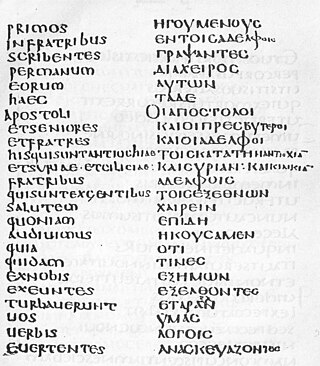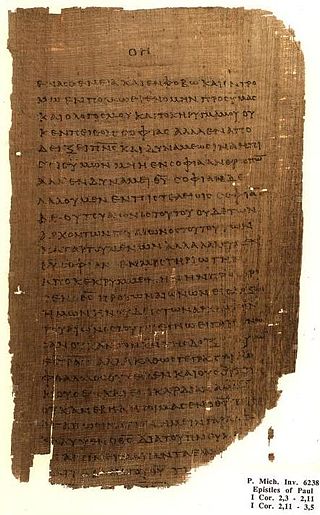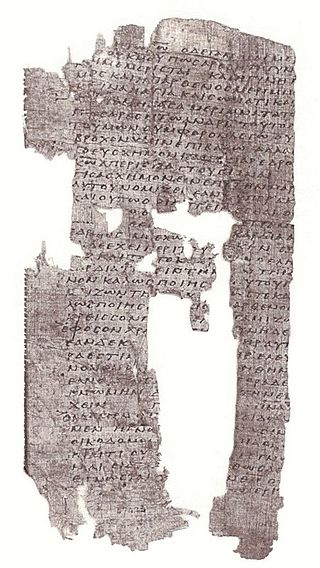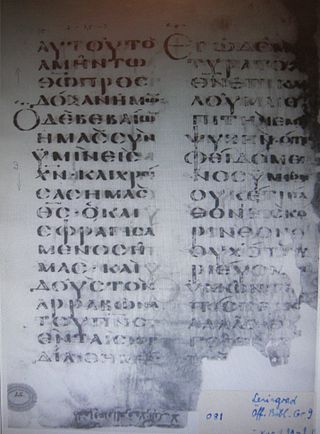
Acts 15 is the fifteenth chapter of the Acts of the Apostles in the New Testament of the Christian Bible. It records "the first great controversy in the records of the Christian Church", concerning the necessity of circumcision, Paul and Barnabas traveling to Jerusalem to attend the Council of Jerusalem and the beginning of Paul's second missionary journey. The book containing this chapter is anonymous, but early Christian tradition uniformly affirmed that Luke composed this book as well as the Gospel of Luke.

Galatians 2 is the second chapter of the Epistle to the Galatians in the New Testament of the Christian Bible. It is authored by Paul the Apostle for the churches in Galatia, written between 49 and 58 AD. This chapter contains the meeting account of Paul, Barnabas and Christians in Jerusalem, considered "one of the most momentous events in the earliest Christianity", and the dispute between Paul and Peter.

Acts 9 is the ninth chapter of the Acts of the Apostles in the New Testament of the Christian Bible. It records Saul's conversion and the works of Saint Peter. The book containing this chapter is anonymous but early Christian tradition uniformly affirmed that Luke composed this book as well as the Gospel of Luke.

Acts 11 is the eleventh chapter of the Acts of the Apostles in the New Testament of the Christian Bible. It records that Saint Peter defends his visit to Cornelius in Caesarea and retells his vision prior to the meeting as well as the pouring of Holy Spirit during the meeting. The book containing this chapter is anonymous but early Christian tradition uniformly affirmed that Luke composed this book as well as the Gospel of Luke.

Acts 21 is the twenty-first chapter of the Acts of the Apostles in the New Testament of the Christian Bible. It records the end of Paul's third missionary journey and his arrival and reception in Jerusalem. The narrator and his companions ("we") play an active part in the developments in this chapter. The book containing this chapter is anonymous, but early Christian tradition uniformly affirmed that Luke composed this book as well as the Gospel of Luke.

1 Corinthians 2 is the second chapter of the First Epistle to the Corinthians in the New Testament of the Christian Bible. It is authored by Paul the Apostle and Sosthenes in Ephesus, composed between 52–55 CE.

1 Corinthians 7 is the seventh chapter of the First Epistle to the Corinthians in the New Testament of the Christian Bible. It is authored by Paul the Apostle, a citizen of Tarsus and Sosthenes in Ephesus. In this chapter, Paul replies to certain questions raised by the Corinthian church in a letter sent to him.

1 Corinthians 9 is the ninth chapter of the First Epistle to the Corinthians in the New Testament of the Christian Bible. It is authored by Paul the Apostle and Sosthenes in Ephesus. Paul defends himself as an apostle.

1 Corinthians 10 is the tenth chapter of the First Epistle to the Corinthians in the New Testament of the Christian Bible. It is authored by Paul the Apostle and Sosthenes in Ephesus. In this chapter Paul writes about the Corinthians' Exodus journey and the Eucharist, and returns to the subject of food offered to idols. The argument concerning meats offered to idols is resumed in 1 Corinthians 10:14.

2 Corinthians 1 is the first chapter of the Second Epistle to the Corinthians in the New Testament of the Christian Bible. It is authored by Paul the Apostle and Timothy in Macedonia in 55–56 CE.

2 Corinthians 2 is the second chapter of the Second Epistle to the Corinthians in the New Testament of the Christian Bible. It is authored by Paul the Apostle and Timothy in Macedonia in 55–56 CE.

2 Corinthians 6 is the sixth chapter of the Second Epistle to the Corinthians in the New Testament of the Christian Bible. It is authored by Paul the Apostle and Timothy in Macedonia in 55–56 CE.

2 Corinthians 7 is the seventh chapter of the Second Epistle to the Corinthians in the New Testament of the Christian Bible. It is authored by Paul the Apostle and Timothy in Macedonia in 55–56 CE.

2 Corinthians 8 is the eighth chapter of the Second Epistle to the Corinthians in the New Testament of the Christian Bible. It is authored by Paul the Apostle and Timothy in Macedonia in 55–56 CE. This chapter, and the next one, "are devoted entirely to the topic of generous giving".

2 Corinthians 10 is the tenth chapter of the Second Epistle to the Corinthians in the New Testament of the Christian Bible. It is authored by Paul the Apostle and Timothy in Macedonia in 55–56 CE. According to theologian Heinrich August Wilhelm Meyer, chapters 10–13 "contain the third chief section of the Epistle, the apostle's polemic vindication of his apostolic dignity and efficiency, and then the conclusion".

2 Corinthians 11 is the eleventh chapter of the Second Epistle to the Corinthians in the New Testament of the Christian Bible. It is authored by Paul the Apostle and Timothy in Macedonia in 55–56 CE. According to theologian Heinrich August Wilhelm Meyer, chapters 10–13 "contain the third chief section of the Epistle, the apostle's polemic vindication of his apostolic dignity and efficiency, and then the conclusion".

2 Corinthians 12 is the twelfth chapter of the Second Epistle to the Corinthians in the New Testament of the Christian Bible. It is authored by Paul the Apostle and Timothy in Macedonia in 55–56 CE.

Galatians 1 is the first chapter of the Epistle to the Galatians in the New Testament of the Christian Bible. It is authored by Paul the Apostle for the churches in Galatia, written between 49 and 58 AD. This chapter contains Paul's significant exposition concerning the significance of God's revelation of Jesus Christ.

Ephesians 1 is the first chapter of the Epistle to the Ephesians in the New Testament of the Christian Bible. Traditionally, it is believed to have been written by Apostle Paul while he was in prison in Rome, but more recently, it has been suggested that it was written between AD 80 and 100 by another writer using Paul's name and style. This chapter contains the greeting, followed by a section about "The Blessing of God" and Paul's prayer.

Ephesians 2 is the second chapter of the Epistle to the Ephesians in the New Testament of the Christian Bible. Traditionally, it is believed to have been written by Apostle Paul while he was in prison in Rome, but more recently it has been suggested that it was written between AD 80 and 100 by another writer using Paul's name and style.









